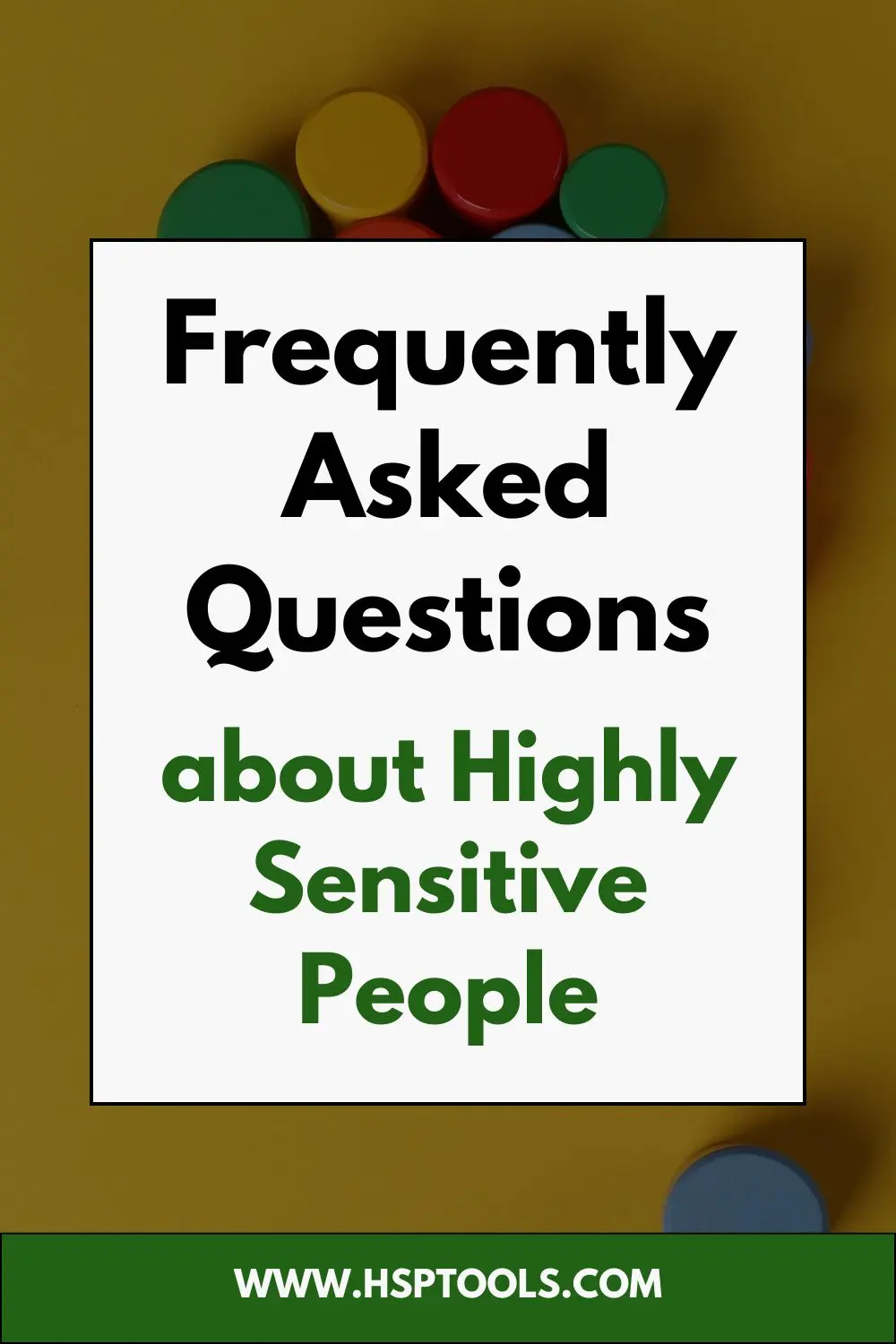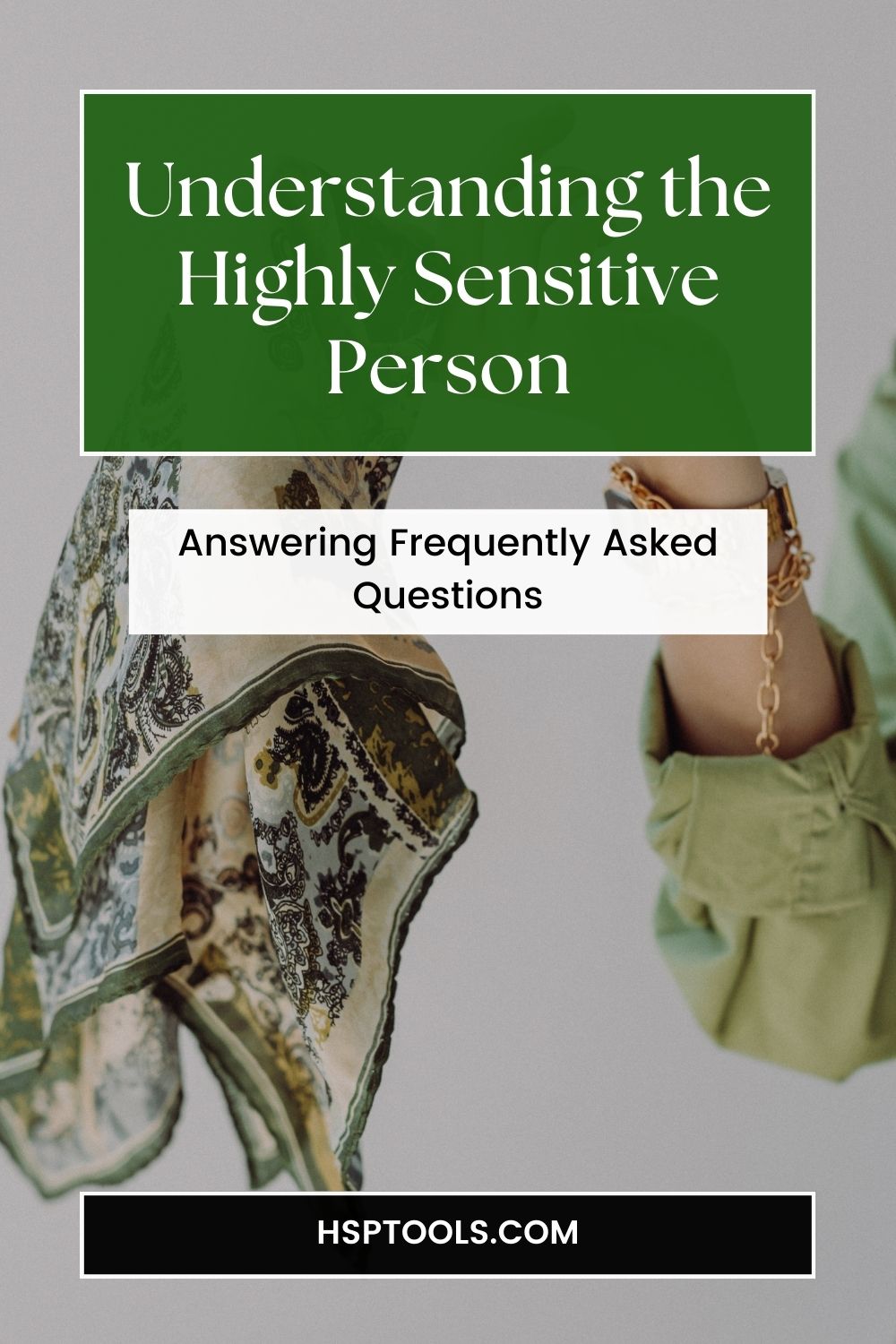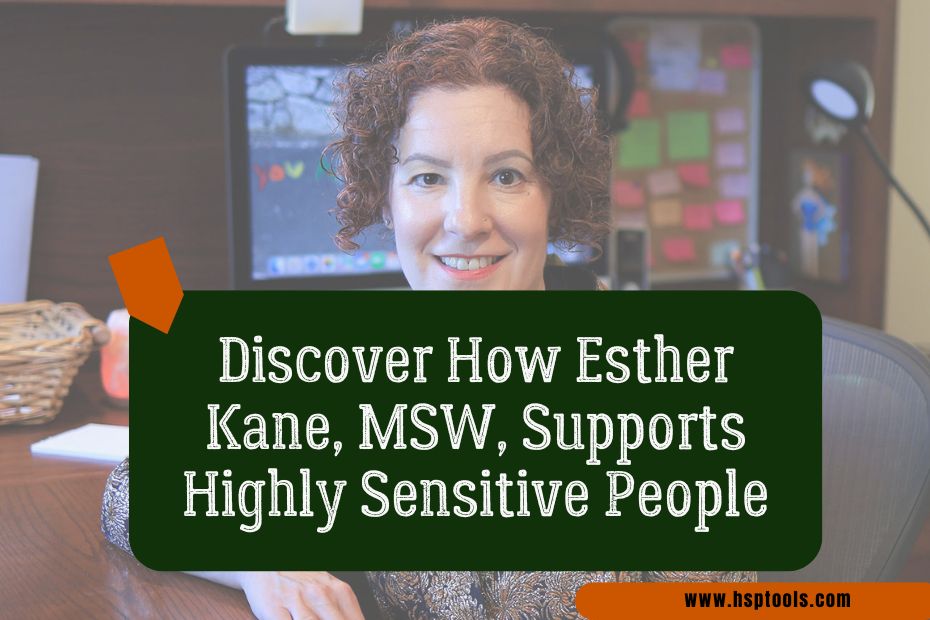HSP FAQs: Frequently Asked Questions about the Highly Sensitive Person

Welcome to our comprehensive guide on Frequently Asked Questions (FAQs) about the Highly Sensitive Person (HSP).
Whether you’re an HSP seeking to understand yourself better or someone supporting a sensitive loved one, this resource is designed to provide clear, research-based answers to your questions.
Why these HSP FAQs are Important
Highly Sensitive People experience the world differently, often processing sensory input and emotions more intensely than others.
While this trait brings exceptional strengths, like heightened empathy and creativity, it also comes with challenges, such as overstimulation and emotional overwhelm.
These Highly Sensitive Person FAQs demystify high sensitivity, empower HSPs to embrace their unique traits and offer practical insights for navigating relationships, work, and self-care.
They cover everything from the science behind sensitivity to strategies for thriving in a fast-paced world.
Read the guide to discover how high sensitivity works, why it matters, and how it can be celebrated as a powerful gift.

General Understanding of HSPs
1. What does it mean to be a Highly Sensitive Person (HSP)?
A Highly Sensitive Person (HSP) is someone with a trait known as Sensory Processing Sensitivity (SPS) or High Sensitivity. The trait is characterized by heightened sensitivity to environmental and social stimuli.
HSPs often process information deeply, respond strongly to sensory input, and experience emotional and physical reactions to subtle cues that others may not notice.
This sensitivity isn’t a disorder or flaw but a natural variation in human temperament. Approximately 20-30% of the population is thought to possess this trait, making it a common, though often misunderstood, part of human diversity.
2. How is high sensitivity defined in psychology?
High Sensitivity, or Sensory Processing Sensitivity (SPS), is a biologically based trait identified through psychological research. It involves an enhanced ability to notice subtleties, process stimuli deeply, and react strongly to positive and negative experiences.
The scientific foundation for high sensitivity includes studies showing differences in brain activity, particularly in regions associated with empathy, awareness, and processing of emotional stimuli.
Elaine Aron, a psychologist who popularized the term, highlighted the depth of processing and overstimulation as hallmark features of this trait.
3. Who coined the term “Highly Sensitive Person”?
Dr. Elaine Aron, a leading researcher and psychologist, coined the term “Highly Sensitive Person” in the 1990s. Her groundbreaking work included identifying sensory processing sensitivity (SPS) as a measurable and significant trait.
Dr. Aron’s research began with studies on introversion and sensitivity, which led to the publication of her influential book, The Highly Sensitive Person, in 1996.
This book helped bring awareness to the experiences of HSPs and validated their unique way of navigating the world.
4. How does high sensitivity differ from introversion or shyness?
While high sensitivity, introversion, and shyness can overlap, they are distinct concepts.
High sensitivity refers to a temperamental trait involving deeper sensory and emotional processing. Introversion is a preference for quieter, less stimulating environments, and shyness is often linked to fear of social judgment or awkwardness.
Studies suggest that roughly 30% of HSPs are extroverted, which means not all HSPs are introverts. And, unlike shyness, high sensitivity doesn’t necessarily involve social anxiety.
HSPs may become overwhelmed in social situations due to sensory overload or emotional intensity, which may be mistaken for introversion or shyness.
5. Is high sensitivity a personality trait or a disorder?
High sensitivity is a personality trait, not a disorder. It is a neutral characteristic found in about one-fifth of the population and exists along a temperamental continuum.
This trait has evolutionary advantages, such as heightened awareness of threats and opportunities, which may have helped early humans survive.
It’s crucial to distinguish high sensitivity from mental health conditions like anxiety or depression. But it’s also worth noting that HSPs may be more vulnerable to these conditions if they don’t learn to manage overstimulation or emotional overwhelm.
6. How common is high sensitivity in the general population?
Research indicates that 20-30% of the population are Highly Sensitive People (HSPs). This prevalence is consistent across genders, cultures, and species, as studies have also identified the trait in animals.
This high frequency suggests that High Sensitivity is vital in human evolution, contributing to strengths like heightened awareness and caregiving.
However, because the majority of people are less sensitive, HSPs often feel out of place in modern, fast-paced societies.
7. Are there scientific studies that support the concept of HSPs?
Yes, numerous scientific studies support the concept of Highly Sensitive People. Elaine Aron’s foundational research identified sensory processing sensitivity (SPS) as a measurable trait, confirmed by psychological tests like the Highly Sensitive Person Scale (HSPS).
Neurological studies show that HSPs exhibit increased activity in brain regions related to awareness, empathy, and sensory processing.
Functional MRI scans, for instance, reveal strong responses in the insula and mirror neuron systems of HSPs when exposed to emotional or sensory stimuli.
8. How does high sensitivity relate to sensory processing sensitivity (SPS)?
High sensitivity is a lay term for the scientific trait Sensory Processing Sensitivity (SPS).
SPS describes a heightened and deep ability to process sensory input and emotional stimuli, which leads to increased sensitivity to the environment and social interactions.
SPS is distinct from sensory processing disorder (SPD), which involves dysfunction in sensory information processing. It is not a disorder but a variation in temperament, with challenges and strengths depending on the individual’s environment and coping strategies.
9. Can HSPs be extroverted, or are they all introverted?
While many HSPs are introverted, about 30% of them are extroverted. Extroverted HSPs face unique challenges, as they crave social interaction but can still experience overstimulation in lively environments.
This blend of traits often results in a need for balance, leading extroverted HSPs to seek meaningful social connections while ensuring they have downtime to recharge.
Understanding this distinction helps dispel the stereotype that all HSPs are reserved or solitary.
10. Is being an HSP hereditary?
Research suggests that High Sensitivity has a genetic component, making it an inherited trait. Studies on twins and families indicate that sensitivity tends to run in families, with environmental factors also influencing how the HSP trait develops.
Epigenetics may also influence sensitivity. For example, supportive environments can enhance the strengths of HSPs, while negative experiences can lead to heightened emotional vulnerability.
This interaction of nature and nurture underscores the complexity of high sensitivity as a trait.

Signs and Characteristics
11. What are the common signs of being an HSP?
Common signs of being a Highly Sensitive Person (HSP) include heightened sensitivity to sensory input (such as bright lights, strong smells, or loud sounds), a tendency to feel deeply moved by art or music, and a strong reaction to the emotions of others.
HSPs also process experiences deeply, often reflecting extensively on their thoughts and feelings. Other signs include needing quiet or alone time to recover after social interactions, being easily startled, and disliking sudden changes.
While these characteristics may pose challenges, they also enhance creativity, empathy, and attention to detail.
12. How do HSPs respond to sensory stimuli like bright lights or loud sounds?
HSPs often have a heightened sensitivity to sensory input, meaning they can quickly feel overwhelmed by bright lights, loud noises, or strong smells. This response stems from their nervous system’s increased reactivity, making overstimulation a frequent challenge.
For example, an HSP might struggle in a bustling office with fluorescent lights or feel drained after attending a concert. However, their sensitivity can also enable them to appreciate subtle beauty in their surroundings, such as soft music or intricate design details.
13. Are HSPs more prone to emotional overwhelm?
Yes, Highly Sensitive People (HSPs are more prone to emotional overwhelm because they deeply process emotions and are highly empathetic. They may feel their own emotions intensely and also absorb the feelings of those around them, which can sometimes become exhausting.
For instance, an HSP might feel deeply affected by a friend’s distress or become overwhelmed in emotionally charged situations like arguments or celebrations. While this can be challenging, it also allows HSPs to form deep connections and offer genuine support to others.
14. Do HSPs have stronger empathy than others?
HSPs often exhibit higher levels of empathy due to their ability to sense and process emotions deeply.
Studies suggest that the brains of HSPs show greater activation in regions associated with empathy, such as the mirror neuron system, when observing others’ emotions.
This heightened empathy allows HSPs to connect deeply with people and understand their feelings intuitively. However, it can also lead to emotional fatigue, as they may struggle to set boundaries when absorbing others’ emotional experiences.
15. Why do HSPs need more downtime to recover?
HSPs need more downtime to recover because they are easily overstimulated by sensory and emotional input. This recovery time allows them to process their experiences, recharge, and regain balance after engaging with overwhelming environments or social situations.
Some downtime rituals for HSPs include spending time alone, engaging in calming activities (like reading or meditation), and being in a quiet, low-stimulating space.
Regularly prioritizing this recovery time is essential for an HSP’s mental and physical well-being.
16. Can HSPs notice subtleties others might miss?
Yes, HSPs are often highly attuned to subtleties in their environment, such as minor shifts in someone’s tone of voice, subtle changes in lighting, or faint background sounds.
This heightened awareness stems from their deeply processing nature, which allows them to pick up on details others may overlook.
This ability can be a significant strength, enabling Highly Sensitive People to excel in roles that require keen observation, such as counselling, design, or analysis. However, it can also contribute to sensory overload if they process too much information.
17. How do HSPs typically handle conflict?
HSPs often find conflict particularly challenging because they process emotions deeply and can become easily overwhelmed by tension or hostility.
They may avoid conflict to preserve harmony, sometimes leading to internal stress or unresolved issues.
When addressing conflict, HSPs prefer calm, respectful discussions where they feel heard and valued. Their strong empathy often drives them to seek mutually beneficial solutions, though they may need time afterwards to decompress emotionally.
18. Why do HSPs often feel misunderstood?
HSPs often feel misunderstood because their deep emotional responses and need for downtime can be misinterpreted as being overly sensitive, shy, or withdrawn.
In a society that often values resilience and extroversion, their sensitivity may be seen as a weakness rather than a strength. This misunderstanding can lead to feelings of isolation or frustration.
However, as awareness of high sensitivity grows, many HSPs find validation and support through resources, communities, and relationships that value their unique perspective.
19. Do HSPs have vivid dreams or strong imaginations?
HSPs frequently report having vivid dreams and a rich imagination. Their tendency to process information profoundly extends into their subconscious, resulting in colourful, emotional, or symbolic dreams.
Their imagination is also a significant strength, fostering creativity in art, storytelling, and problem-solving.
However, their vivid inner world can sometimes make it challenging to separate reality from their imagined fears or anxieties, underscoring the importance of grounding practices.
20. Are HSPs more likely to experience anxiety or depression?
HSPs are more vulnerable to anxiety and depression, especially if they grow up in unsupportive or stressful environments. Their heightened sensitivity means they may absorb negative experiences more deeply, leading to increased emotional distress.
On the other hand, HSPs who have supportive relationships and coping strategies are less likely to experience these challenges.
Studies show that HSPs thrive in nurturing environments, developing resilience and using their sensitivity as a strength. Proactive self-care and therapy can also help mitigate mental health risks.
Pin for Later!

More HSP Resource Guides
- HSP Podcasts: Your Guide to 24 Podcasts for Highly Sensitive People
- A Complete Guide to the Sensitive Empowerment Community by Julie Bjelland
- HSP Masterclasses: An In-depth Guide to Free Masterclasses for Highly Sensitive People
- HSP Books: A Beginner’s Guide to 30 Best Books for Highly Sensitive People
- HSP Courses: A Comprehensive Guide to 20 Online Courses for HSPs
- HSP Blogs & Websites: Your Guide to 27 Online Platforms for Highly Sensitive People
- HSP Support Groups: The Updated Guide to 17 Communities for HSPs






